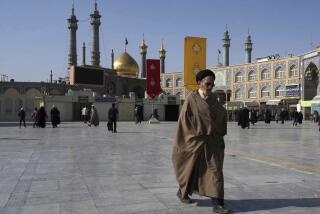Egyptian sheik’s outburst against Shiites roils Iran
- Share via
CAIRO — A popular Sunni Muslim cleric with a television show and a website that churns out religious edicts and dieting tips agitated centuries-old animosities in the Islamic world recently by referring to Shiite Muslims as heretics seeking to invade Sunni societies.
The bitter, often bloody, divide between the two main branches of Islam has been an undercurrent since the 7th century, but Sheik Yusuf Qaradawi’s vitriol comes at a fragile time, when Sunni countries such as Saudi Arabia and Egypt are wary that the predominantly Shiite nations of Iraq and Iran could destabilize the region.
With populist fervor, Qaradawi’s comments intertwined religious mistrust with political suspicion. Iran’s nuclear program and influence with the Shiite-led government in Iraq and the radical group Hezbollah in Lebanon have agitated Sunni governments. Fighting between Shiites and Sunnis in Iraq, which left tens of thousands dead since the U.S. invasion of 2003, has calmed, but the Sunni Arab minority worries about its future.
“Shiites are Muslims but they are heretics and their danger comes from their attempts to invade Sunni society,” said Qaradawi, who was quoted in the Egyptian independent daily Al Masry al Youm. “They are able to do that because their billions of dollars trained cadres of Shiites proselytizing in Sunni countries. . . . We should protect Sunni society from the Shiite invasion.”
Those opinions were first published Sept. 6. Since then, Qaradawi, a man with a polished voice and a gray beard who hosts a show on Islamic law on TV channel Al Jazeera, has been chastised by Shiite scholars and writers in what has turned into a war of polemics and personal attacks played out on websites and in newspapers from Doha to Cairo.
Qaradawi’s statements are dangerous and may “push the Muslim people in the direction of more division,” Ayatollah Mohammed Taskhiri, vice president of the International Union of Muslim Scholars, was quoted as saying in the Iranian press. The Tabnak News Agency, which is close to Iran’s Revolutionary Guard Council, condemned the comments as a “calculated conspiracy against Iranian Shiites.”
Another leading Shiite cleric, Ayatollah Mohammed Hussein Fadlallah of Lebanon, said Qaradawi was instigating fitna, or civil strife.
The protests have not fazed Qaradawi; he has appeared more defiant.
“I do not care and I am not shaken by this stir. I made this statement to answer to the dictates of my conscience and religion and responsibility,” he said in a second interview with Al Masry al Youm published Thursday. “I am trying to preempt the threat before it gets worse. If we let Shiites penetrate Sunni societies, the outcome won’t be praiseworthy. The presence of Shiites in Iraq and Lebanon is the best evidence of instability.”
Qaradawi is a prominent moderate cleric, but he has grown skeptical of Shiite intentions. Two years, ago he suggested that Shiites were using the mystical Sufi order of Islam as a cover to penetrate Sunni society. His most recent volleys undercut efforts by Islamic leaders to ease religious tensions, and raise questions about his motivations. Much of the funding for Qaradawi’s Qatar-based media enterprises comes from Sunni nations uneasy over Iran’s widening influence in the Persian Gulf.
Abul-Fazel Amoee, an Iranian political scientist, said Qaradawi had become an instrument of anti-Shiite propaganda orchestrated by Sunni royals. He said this parallels the “deep rivalry between Saudi Arabia and the Islamic Republic of Iran, and the stage of this competition or ideological battle today is the field of Iraq.”
Sectarian differences should “not be handled by exchanging outlandish and fanatical statements. I’m talking about both sides -- Qaradawi and the Shiites,” said Abdel Moati Bayoumi, a religious scholar and member of Egypt’s Islamic Research Academy. He said divisions between Sunnis and Shiites, which began as a fight over succession after the death of the prophet Muhammad in the 7th century, would weaken Muslim states and serve foreign interests.
Qaradawi’s attacks on Shiites received both support and derision in cyberspace, where Islam’s internal battles and other dilemmas, such as relations with the West, are increasingly debated. The website for Arabic Radio of Iran was buzzing with posts.
“O, Qaradawi, may God guide you to the right path. Your statements, which don’t follow any logic, sow the seeds of sectarianism,” wrote Ahmed Noaimi, a Shiite from Bahrain. “Sunnis and we are brothers in Bahrain. I don’t know why this war against Shiites; we are Muslims at the end. Why are you making such a statement instead of calling for the unity of both sects? Use your brain, respected sir.”
Another respondent, Abu Idris, wrote: “May God protect the respected sheik. He was patient toward what the Shiites have been doing until he felt he had to yell in their faces and draw the attention of their rational people to the danger of what they are doing in the Muslim world.”
--
jeffrey.fleishman @latimes.com
Noha El-Hennawy of The Times’ Cairo Bureau and special correspondent Ramin Mostaghim in Tehran contributed to this report.
More to Read
Sign up for Essential California
The most important California stories and recommendations in your inbox every morning.
You may occasionally receive promotional content from the Los Angeles Times.











